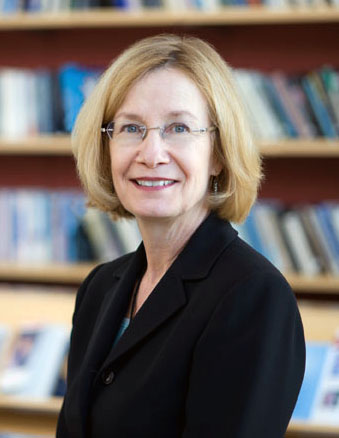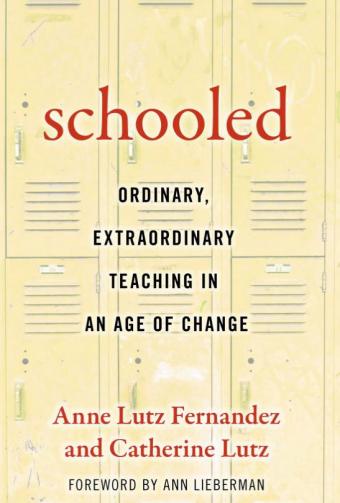PROVIDENCE, R.I. [Brown University] — The national education system is frequently discussed and debated, but it’s often policymakers, not teachers, doing the talking. In an effort to give a louder voice to those closest to the subject, anthropologist Catherine Lutz and her sister, high school teacher Anne Lutz Fernandez, traveled the country to speak with a range of educators, from traditional public schools to charters to the homeschool; early in careers and near retirement; in city, town, suburb, and country.
The result is Schooled: Ordinary, Extraordinary Teaching in an Age of Change (Teachers College Press), a book, due out later this month, that’s a revealing look at teachers’ perspectives on a range of topics, including how current reforms like curricular standardization and increased testing are affecting teaching, as well as successes of the system.
Lutz, the Thomas J. Watson Jr. Family Professor of Anthropology and International Studies, spoke with Courtney Coelho about writing the book and some of her findings.

“Despite their many challenges, [teachers] derive deep satisfaction from their relationships with students, parents, and other teachers. ... We saw firsthand the tremendous affection they have for and get from their students and the larger community they work in.”
Why was it important to feature personal accounts of teachers around the country, rather than simply reporting research findings?
We were inspired to write the book by a national debate about education dominated by the voices of those who have no experience as educators. Politicians, pundits, and business leaders are driving the conversation and pushing through reforms to a system that is populated with experts on the topic — teachers — whose voices are barely heard. We wanted to give teachers an opportunity to share their experience- and knowledge-based perspectives.
While survey data gets at a range of educator opinion, we wanted a more in-depth picture of some teachers’ thinking and practice. One benefit of this approach was that we were able to highlight the differences between teachers’ experiences based on their backgrounds and school settings. It is critical in this age of standardization in education that we understand the great diversity of teaching and learning contexts across the nation.
What is one of the biggest current challenges the teachers reported?
Broad social and economic changes are making teaching harder: widespread child poverty, widening income inequality, growing cultural and linguistic diversity, rising rates of children with disabilities, frequent school violence, limited job opportunities and ballooning college costs, contracting public budgets, and persistent racism and segregation. The most profound are the basic economics; astoundingly, roughly half of America’s public schoolchildren growing up in low-income households.
Teachers such as Glorianna Under Baggage on South Dakota’s Pine Ridge Reservation are frustrated with reforms that seem to ignore the realities that many children live. She has firsthand knowledge that student achievement, something over which schools have meaningful but limited influence, is profoundly affected by socioeconomic status. A deep body of research has consistently shown that poverty, especially extreme and persistent poverty, has a tremendous and complex impact on children’s physical, social, and emotional health, cognitive ability, and resulting academic achievement.
What is working well for teachers right now?
Although the percentage of teachers reporting high satisfaction with their jobs is the lowest it’s been since the 1980s, it’s still pretty high. Despite their many challenges, they derive deep satisfaction from their relationships with students, parents, and other teachers. Teachers echoed each other frequently when they spoke about the pleasure they get from seeing children’s faces light up when they learn something new. We saw firsthand the tremendous affection they have for and get from their students and the larger community they work in. For example, when asked to journal about a daydream, one little girl said she dreamed her teacher was her mother.
Collaboration with colleagues near and far is also key to teachers’ motivation and ability to develop professionally, with some teachers reaching out to share and build their knowledge via social media with teachers across the country and around the world.
Did teacher perspectives on education and teaching vary significantly by region? If so, what were one or two primary differences?
On the whole, the teachers in Schooled have in common that they take the long view. They see the ultimate purpose of education not as the instruction of children but as the creation of socially competent, productive citizens who fulfill their potential. So they see academics as a means to an end, not the end itself.
Where teachers vary in interesting and necessary ways is in the particular kind of adult they hope to help create. For some, such as Minnesota’s Ulla Tervo-Desnick, Finnish born and trained, this might be a collaborative global citizen; for others, like Illinois English teacher Gary Anderson, this might be a self-actualized social innovator; for those like Ohio homeschooling parent Heather Frantz, this might be a virtuous, service-minded traditionalist. Community values help drive these differences; for Glorianna Under Baggage of Pine Ridge, instilling the values of the Lakota is at the core of what she strives for.
In talking to the teachers about some of the primary reforms being enacted today, was there any issue the teachers seemed to be universally for or against?
When they find reform strategies to be consistent with their educational philosophies, teachers are adopting them. We observed a South Carolina teacher who believes in interdisciplinary approaches employing nonfiction literacy strategies from the Common Core in her chemistry class.
At the other extreme, some are opting out of the system altogether, finding it untenable. Soon after our visit, new teacher Lindsey McClintock left the Arizona classroom in which we saw her take third-graders through scripted, standardized lessons, to enter private counseling, where she hopes to provide children with the social–emotional component being stripped from teaching. And in the vast middle, teachers are working hard to hold on to what they know is good pedagogy. This can lead, as one educator put it, to “sneaking a lot of good teaching” in “under the table.” Other educators, emboldened by experience, reputation, tenure, or school climate, are more vocal in adhering to the methods they know work best.
The elements of current reform that teachers overwhelmingly find problematic are the proliferation of standardized tests. Teachers see higher stress among students who frequently face high-stakes tests that can affect their grade promotion, course placement, and graduation, but also their teacher’s pay or their school’s funding and fate. We saw how fixating on these tests narrows the curriculum — with the arts, social sciences, and physical education reduced in schools that are compelled to devote more time to the tested subjects. To Colorado teacher Robert Lewis this amounts to the system’s deep failure to serve his special needs students, whose talents can be neglected by a strict focus on a few academic subjects and whose knowledge may not be meaningfully measured by tests.
Most disturbing of all is the evidence that our massive testing regime has resulted in little good. National test scores have risen only modestly over the last decade. In other words, it’s not doing much to improve learning — even the narrow band of learning that these tests can assess.

